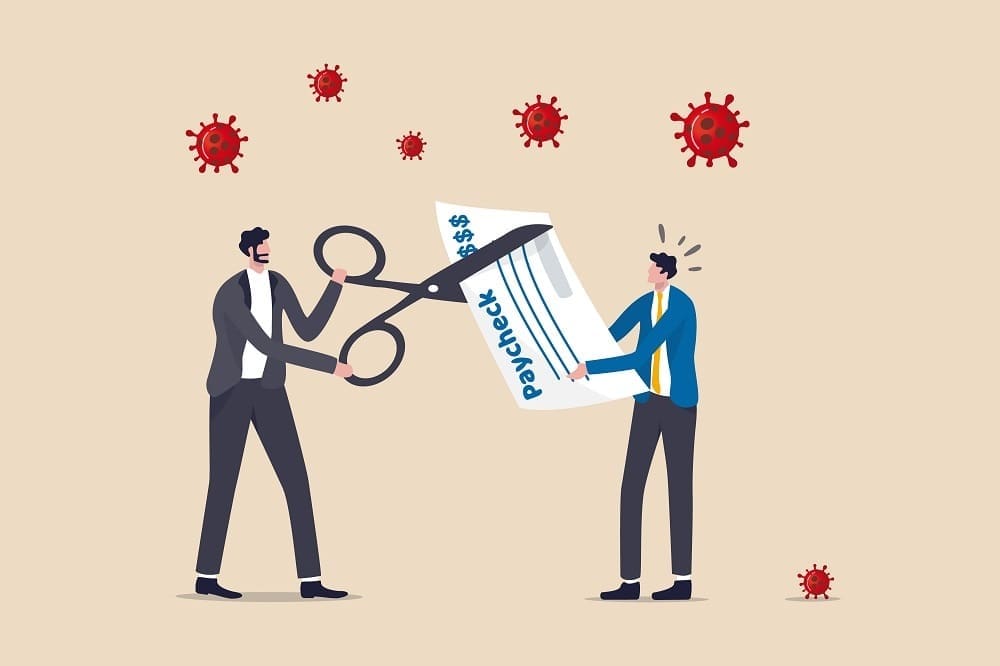Shutdowns caused by COVID-19 have resulted in remote work arrangements, as well as changes to hours worked, pay and duties for many. Businesses looking to “make whole” employees whose pay was reduced need to make sure this good deed doesn’t do more harm than good. Jones Walker’s Maggie Spell explains.
In the wage and hour world, good intentions don’t mean much if a company isn’t in compliance with the Fair Labor Standards Act (FLSA) and, in some jurisdictions, more restrictive state and/or local laws. Indeed, this is an area that can trip up even the most diligent employers under the best of circumstances, let alone during a global pandemic when employers are trying to keep employees healthy, safe and employed.
Despite the myriad challenges facing employers (and the world) right now, it would be foolish to think employees and their legal counsel are going to take it easy on employers simply because of COVID-19 and the ensuing and still ongoing business complications. Employers should always expect that employees may seek out legal counsel — especially when they’re out of work or feel they’ve been mistreated. In fact, wage-and-hour cases seem to bubble up whether or not that’s why the employee sought out counsel in the first place, because it’s such a technical law (and plaintiffs’ attorneys can recover fees). We are already seeing wage-and-hour cases related to COVID-19 being filed across the country.
Given the chaos that has been swirling around most workplaces since March, employers should make wage-and-hour compliance a priority so there aren’t any hiccups to be taken advantage of down the road. To minimize potential liability, let’s consider a few areas that may need extra attention right now and how they tie into the litigation trends we’re anticipating.
Timekeeping Troubles
During the pandemic, many employees have been telecommuting, and from what we’re hearing, this way of working is continuing where employees are able to be productive at home and still perform at least the bulk of their job duties. For nonexempt workers, this may be the first time they’re working remotely. Since this can present its own challenges, it’s prudent to strengthen timekeeping policies and regularly reiterate the company’s practices to minimize the risk of off-the-clock cases, as this is an area where we’re expecting litigation.
It should be clear to employees that the company will enforce its policies in the same manner it would if employees were working in the office; employers need to make sure this is actually happening. For example, if an employee typically works a set schedule, make sure it’s clear that’s still the case while the employee is telecommuting, but recognize there may need to be changes to the schedule based on child care or other needs. If the same employee is sending emails outside of that schedule and what’s being reported to the company as hours worked, this needs to be addressed with the employee. It’s one thing if an employee is performing job duties outside of working hours and the company isn’t aware of it (though, again, it should be clear this isn’t allowed), but it’s going to present a far bigger problem if the company knew or should have known the employee was performing this off-the-clock work. Along the same lines, managers and supervisors should be reminded that they shouldn’t be communicating with nonexempt employees outside of work hours. If a supervisor calls or texts an employee after hours, this could require additional pay or create a claim that the employee wasn’t paid for all hours worked.
Those of us who defend wage and hour litigation are partial to employee certification of time worked. It’s always helpful to be able to point to an employee’s acknowledgment that the time being reported is accurate and reflects all time worked. This is also a great opportunity to remind employees that the company doesn’t permit off-the-clock work. In the event that employee certification normally happens but isn’t being done while employees are working remotely, find a way to make that acknowledgment happen in the timekeeping system used by those telecommuting.
Speaking of, this is a good time to put a telecommuting policy in place (if this hasn’t been done already) or to ensure the current policy sufficiently addresses concerns that may arise under these unique circumstances. Particularly with respect to nonexempt employees, the company should make clear what hours employees are expected to work, how time should be kept while working remotely and procedures for communicating with managers (and the flip side of this, such as the example above about an employee getting a call from a supervisor after hours). Employees should also be reminded that meal and rest breaks work the same way as they would in the office (and, of course, be sure what’s provided complies with state and local guidelines).
Misclassification Mishaps
While the FLSA doesn’t limit the types of work employees age 18 and older may be required to perform, even if the duties are outside of their typical job duties, it is important to be mindful of what nonexempt duties exempt workers are being asked to perform, why and for how long. The reason for this is simple: to qualify as exempt under one of the executive, administrative, professional or outside sales exemptions, employees have to meet certain tests regarding their job duties and be paid on a salary basis not less than $684 per week (which we’ll talk about momentarily).
So, if a company is short-staffed because of COVID-19 and an exempt employee needs to perform nonexempt duties, does the employee lose the exemption? Well, it depends. There’s a little-used regulation that, during the period of a public health emergency declared by a federal, state or local authority (as is the case with COVID-19), allows otherwise exempt employees to temporarily perform nonexempt duties that are required by the emergency without losing the exemption. (Of course, the employees must still be paid a salary of at least $684 per week.) Looking to precedent and recent Department of Labor guidance, COVID-19 is consistent with the regulatory criteria for emergencies: It’s a rare event affecting the public welfare, wholly beyond employers’ control, unanticipated and threatening to employee safety.
But there are a couple of caveats that must be satisfied in order for such duties to fall under this regulation: These new job duties have to be temporary, so this can’t be a permanent change to the employee’s duties, and the change has to be due to the public health emergency. We don’t yet know exactly what “temporary” will mean in terms of COVID-19, so this will likely be an area where litigation crops up down the road.
Given this, it would be wise to monitor changes to exempt employees’ duties moving forward to ensure proper classification. In fact, it’s always a good idea to conduct regular audits of exempt positions to ensure they’re being treated correctly.
Changes to Compensation
Let’s first address exempt employees and the salary-basis requirement. As a refresher, being paid on a salary basis means an employee regularly receives a predetermined amount of compensation each pay period on a weekly or less frequent basis. That predetermined amount can’t be reduced because of variations in the quality or quantity of the work, and generally speaking, an exempt employee must receive the full salary for any workweek in which the employee performs work, regardless of the number of days or hours worked (subject to a few specifically enumerated circumstances that allow for deduction).
During this challenging time, reducing the salaries of exempt employees may be an enticing option to cut expenses when faced with financial constraints. There are, however, some potential pitfalls to avoid: Dropping an employee’s salary below $684 per week is obviously a problem, because that’s the minimum required by federal law (Be sure to check state or local law for more generous salary requirements.), and an employee’s weekly salary may be reduced only prospectively, so a salary can’t be changed after the fact because of the amount of work performed.
What happens when the company wants to reduce the salary further or wants to restore an employee’s salary to its pre-pandemic level? While this can be done, whether it’s advisable depends on how much time has passed since the last pay change. An exempt employee’s salary should remain consistent for a reasonable period of time (at least a month, but better if it’s a quarter). A salary can’t be repeatedly changed, or it starts to look less like a salary and more like it’s tied to quality or quantity of work, which may put the salary-basis test at risk. So, when making changes to exempt employee salaries, be mindful of the minimum as well as how often and why changes are being made.
Turning to nonexempt employees, it’s crucial to ensure these employees are still receiving at least minimum wage for every hour worked (and remember to check state and local law for a minimum wage that’s higher than the federal rate). And these employees must get overtime for all hours worked over 40 in a workweek under the FLSA, though some states or localities provide for more generous overtime payments. Pay attention to business expenses an employee may be incurring while working remotely, as an employer can’t require payment or reimbursement for business expenses if it will drop the employee’s earnings below the required minimum wage or overtime rate. Also, employers can’t decide to pay nonexempt employees a flat sum of money regardless of how many hours the employees work, start paying straight time for overtime simply because of cash flow issues or ask employees in the private sector to take paid time off that is earned and accrued by an employee instead of immediate cash payment for working overtime hours (often referred to as “comp time”).
When business turns around, an employee’s hourly wage can be raised back up to what it was before the pandemic. As an administrative matter, ensure that the overtime rate is changed as well, or this could create a claim for the difference owed in overtime.
What happens if an employer wants to make it up to a nonexempt employee for “taking one for the team?” The employer must be sure to give thought to what this payment is and what has been said to employees and to analyze whether a recalculation of overtime due is required. For example, if a company promised employees it would make up the difference when things were looking brighter, that looks more like a nondiscretionary bonus that has to be added into the regular rate across the period it covers, such that additional overtime would need to be paid to the employees. On the other hand, if there wasn’t such a representation on the front end and a company now wants to give employees an extra $1,000, that looks more like a discretionary bonus. In short, the more closely the make-up payment is tied to the hours worked and the employee’s prior rate of pay, the stronger the argument will be that additional compensation is due. The best practice is to work with employment counsel to ensure this is handled properly, or these changes to compensation and make-up payments could result in litigation.
As we continue to encounter new challenges presented by COVID-19 from one day to the next and move forward into a new normal, keeping wage and hour issues top of mind is key. Employees who are responsible for ensuring company compliance with the FLSA have plenty on their plates already trying to keep the workplace safe, so it would be smart for them to stay in regular communication with their employment counsel. There’s enough to keep up with these days, and given that guidance is still being regularly issued as well as changed, relying on outside counsel can help employers stay on top of these potential pitfalls.



 Maggie Spell is a partner in the Labor & Employment Practice Group at
Maggie Spell is a partner in the Labor & Employment Practice Group at 






